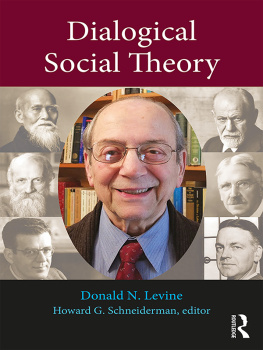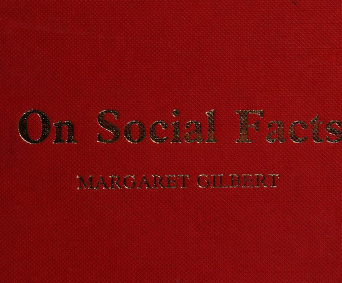
On social facts
Gilbert, Margaret
This book was produced in EPUB format by the Internet Archive.
The book pages were scanned and converted to EPUB format automatically. This process relies on optical character recognition, and is somewhat susceptible to errors. The book may not offer the correct reading sequence, and there may be weird characters, non-words, and incorrect guesses at structure. Some page numbers and headers or footers may remain from the scanned page. The process which identifies images might have found stray marks on the page which are not actually images from the book. The hidden page numbering which may be available to your ereader corresponds to the numbered pages in the print edition, but is not an exact match; page numbers will increment at the same rate as the corresponding print edition, but we may have started numbering before the print book's visible page numbers. The Internet Archive is working to improve the scanning process and resulting books, but in the meantime, we hope that this book will be useful to you.
The Internet Archive was founded in 1996 to build an Internet library and to promote universal access to all knowledge. The Archive's purposes include offering permanent access for researchers, historians, scholars, people with disabilities, and the general public to historical collections that exist in digital format. The Internet Archive includes texts, audio, moving images, and software as well as archived web pages, and provides specialized services for information access for the blind and other persons with disabilities.
Created with abbyy2epub (v.1.7.6)
WARD EDWARDS
LIBRARY
WARRENSBURG, MISSOURI
On social facts Gilbert, Margaret
i
' H s *
i.
r* -7 ] ' .1 Q
b a 4 o -t o
On Social Facts
MARGARET GILBERT
On Social Facts is a philosophical essay with strong implications for social theory and other areas of thought. In the tradition of sociologists Weber and Durkheim, Margaret Gilberts concern is to give a general characterization of the core phenomena at issue in the domain of human social life. Unlike the founders of sociology, however, her methodology comes from philosophy. After developing careful detailed analyses of a number of central everyday concepts of social phenomena - including the concepts of a shared action, a social convention, a groups belief, and a group itself - she proposes that the core social phenomena among human beings are what she calls plural subject phenomena. Social groups are plural subjects, a groups belief is the belief of a plural subject, and so on. The conceptual scheme of plural subjects, she argues, is both implicit in the discourse of everyday life and an essential adjunct to the proper description of that life. Social theory, political philosophy, and other disciplines, then, need to familiarize themselves with the details of the plural subject concepts. In arriving at her analyses and her final proposal Gilbert discusses the work of a number of other authors, including Emile Durkheim and Georg Simmel, whose accounts of social phenomena are akin to her own in important ways, and Max Weber and David Lewis, who represent an opposing tendency, characterized by Gilbert as acceptance of the limited conceptual framework of singular agency. This tendency is inherent, more generally, in attempts to explain the nature of social processes solely in game-theoretical terms.
Margaret Gilbert is an associate professor of philosophy at the University of Connecticut, Storrs.
First published in 1989 by Routledge
11 New Fetter Lane, London EC4P 4EE 29 West 35th Street, New York NY 10001
1989 Margaret Gilbert
Typeset by Columns of Reading
Printed in Great Britain by TJ Press (Padstow) Ltd.
Padstow, Cornwall
All rights reserved. No part of this book may be reprinted or reproduced or utilized in any form or by any electronic, mechanical, or other means, now known or hereafter invented, including photocopying and recording, or in any information storage retrieval system, without permission in writing from the publishers.
British Library Cataloguing in Publication Data Gilbert, Margaret
On Social facts.(International library of philosophy).
1. Society - Philosophical perspectives I. Title II. Series 301'.01
ISBN 0-415-02444-7
Library of Congress Cataloging in Publication Data
Gilbert, Margaret.
On social facts.
(International library of philosophy)
Bibliography: p.
Includes index.
1. Sociology-Methodology. 2. Social groups.
3. Social action. 4. Collective behavior.
I. Title. II. Series.
HM24.G479 1988 301'.01'8 88-31640
ISBN 0-415-02444-7
nm
/???
For Miriam Gilbert
'
.
/
. \
CONTENTS
Preface and acknowledgements ix
I Introduction: everyday concepts and social reality 1
1 Preamble 1
2 The focus and thesis of this book 1
3 Social science and everyday concepts 3
4 Weber on everyday collectivity concepts 6
5 The everyday concept of a collectivity 8
6 Methodology 10
7 The main themes 12
8 Overview of chapters 14
II Social action and the subject matter of
social science 22
1 Introduction 22
2 Webers account of social action 24
3 The question of collectivities 34
4 Further considerations on Webers concept 44
5 Conclusions 55
III Action, meaning, and the social 58
1 Introduction 58
2 The deep level of the discussion 64
3 Winch on rule-following 71
4 Kripkes Wittgenstein 100
5 The intentionalist programme 128
6 Group languages 132
IV Social groups: a Simmelian view 146
1 Introduction: Simmels statement 146
2 On Sharing in an action 154
3 We 167
4 Social Groups 204
V After Durkheim: concerning collective belief 237
1 Introduction 237
2 Durkheim on social facts: some salient features of
the Rules discussion 243
3 Assessing accounts of collective beliefs: some tests 254
4 The simple summative account 257
5 A second summative account:
adding common knowledge 260
6 A third summative account:
the group as cause 274
7 A nonsummative account of collective belief 288
VI Social convention 315
1 Introduction 315
2 David Lewis on convention 319
3 Critique of Lewis (1): A flawless mechanism? 329
4 Critique of Lewis (2): Lewiss conditions
on convention 339
5 Critique of Lewis (3): Lewis and the ought
of convention 349
6 Critique of Lewis (4): conventions and
collectivities 355
7 Towards an account of social convention 367
8 Social convention 373
VII On social facts 408
1 The structure of everyday collectivity concepts:
summary of results 408
2 The actions of participating individual men 417
Next page















